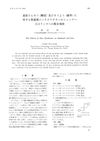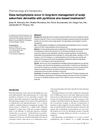
The new gel with Zinc Oxide nanoparticles and finasteride shows promise for treating hair loss when applied to the skin.
 October 2023 in “Acta dermato-venereologica (Print)”
October 2023 in “Acta dermato-venereologica (Print)” People with severe hair loss have lower zinc levels in their blood.

The new skin cream with zinc oxide nanoparticles is stable, spreads well, and doesn't deeply penetrate the skin.
 September 2022 in “International Journal of Health Sciences (IJHS)”
September 2022 in “International Journal of Health Sciences (IJHS)” Low zinc levels may contribute to hair loss due to increased oxidative DNA damage.
 June 2022 in “International Journal of Health Sciences (IJHS) (En línea)”
June 2022 in “International Journal of Health Sciences (IJHS) (En línea)” Pregnant women with hair loss often have low zinc and iron levels.
August 2020 in “Prosiding Farmasi” Zinc pyrithione in shampoo effectively treats dandruff.
 December 2015 in “Dermatologic Therapy”
December 2015 in “Dermatologic Therapy” Zinc sulfate solution is more effective than tea lotion for treating acne rosacea.
February 2013 in “Journal of the American Academy of Dermatology” The zinc pyrithione hair care system improves scalp hydration and reduces water loss.
 April 1978 in “Pediatric research”
April 1978 in “Pediatric research” Patients with anorexia nervosa did not show a correlation between zinc levels and taste perception or the severity of their condition.
 January 1978 in “Yukagaku”
January 1978 in “Yukagaku” Zinc pyrithione in shampoo or rinse reduces dandruff and itching.
March 2023 in “International Journal of bioprinting” Zinc/silicon-infused hydrogel helps regenerate hair follicles.
 January 2022 in “Social Science Research Network”
January 2022 in “Social Science Research Network” A new patch that releases quercetin, copper, and zinc ions under the skin can effectively treat hair loss by promoting hair follicle regeneration.
 December 2020 in “Skinmed”
December 2020 in “Skinmed” Zinc levels are not significantly different in people with hair loss conditions like Androgenetic Alopecia and Alopecia Areata.
 April 2016 in “Journal of The American Academy of Dermatology”
April 2016 in “Journal of The American Academy of Dermatology” People with hair loss have low zinc levels; zinc supplements and laser therapy may help.
 January 2016 in “American Journal of Clinical and Experimental Medicine”
January 2016 in “American Journal of Clinical and Experimental Medicine” Lower zinc levels in hair are linked to more severe male pattern baldness, but blood zinc levels don't show this link. Age also increases baldness severity.
 57 citations,
August 2003 in “British Journal of Dermatology”
57 citations,
August 2003 in “British Journal of Dermatology” Minoxidil and pyrithione zinc combo most effectively increases hair density.
26 citations,
October 2011 in “Biological trace element research” Low copper levels might cause premature graying of hair.
 16 citations,
December 2008 in “International Journal of Dermatology”
16 citations,
December 2008 in “International Journal of Dermatology” Long-term use of pyrithione zinc shampoos remains effective for scalp seborrheic dermatitis, with decreased effectiveness likely due to not following treatment instructions rather than the treatment itself.
 8 citations,
April 2011 in “Surgery today”
8 citations,
April 2011 in “Surgery today” A substance called sodium zinc dihydrolipoylhistidinate can significantly reduce hair loss caused by chemotherapy in rats.
 4 citations,
January 2016 in “Dermatology online journal”
4 citations,
January 2016 in “Dermatology online journal” Using bacitracin zinc and selenium sulfide one after the other can temporarily turn white hair yellow.
 1 citations,
October 2023 in “The Journal of nutrition, health & aging”
1 citations,
October 2023 in “The Journal of nutrition, health & aging” Higher hair levels of zinc and chromium were linked to less cognitive decline in very old people.
 1 citations,
January 2023 in “International journal of urology”
1 citations,
January 2023 in “International journal of urology” Low zinc levels are linked to low testosterone but not to sexual problems.
1 citations,
January 2017 in “Hair therapy & transplantation” Topical zinc-thymulin is safe and effective for treating male pattern baldness.
 January 2024 in “Frontiers in plant science”
January 2024 in “Frontiers in plant science” The zinc finger protein 3 in Arabidopsis thaliana reduces plant growth and root hair development.
7 citations,
January 2017 in “Indian Journal of Dermatology, Venereology and Leprology” 4 citations,
October 2011 in “Medical journal of Tabriz University of Medical Sciences and Health Services” 1 citations,
October 2021 in “Journal of Cosmetic Dermatology”  February 2024 in “International journal of pharmaceutical sciences and nanotechnology”
February 2024 in “International journal of pharmaceutical sciences and nanotechnology” Nanocarriers in gel may reduce side effects of oral hair loss treatments.
February 2023 in “El-Minia Medical Bulletin”  63 citations,
May 2017 in “American Journal of Clinical Dermatology”
63 citations,
May 2017 in “American Journal of Clinical Dermatology” People with alopecia areata often have lower levels of vitamin D, zinc, and folate, but more research is needed to understand if supplements can help treat it.




















